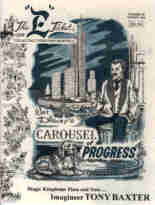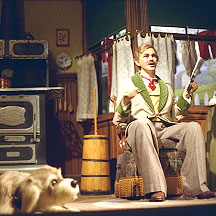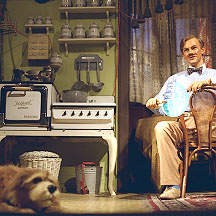 General
Electric's
General
Electric's
Carousel of Progress,
Disneyland
One of Disney's longest-running attractions, the Carousel of Progress was created by Walt Disney for the 1964-65 New York World's Fair, where it was called Progressland. Over its long history the show has changed many times, but has remained what can best be described as a nostalgic, corporatist look at the history of technology in the 20th Century, and more specifically, the influence of electricity. The General Electric Carousel of Progress ran in Disneyland's Carousel Theater from 1967 until 1973. Then, from 1974 to 1988, the bottom level of the Carousel Theater housed a stage show attraction, America Sings. The upper level became the Super-speed Tunnel (and later the World of Tron) for the guests of the PeopleMover. For many years, the lower level served as office space.
After 1975 the show has had a new home in the Magic Kingdom at Walt Disney World. In the move to Florida, the show lost its Progress City act and its original theme song. In 1985, General Electric dropped its sponsorship. A 1994 renovation restored the original theme song.
Guests are seated in a 250 seat theatre that revolves around 6 stages. Beginning in the early 1900's, each stage represents a period in history with the Audio-animatronic family, as the song "It's a Great Big Beautiful Tomorrow" is repeatedly played and sings the praises of, and optimism for, the future.
Join everyone's favorite Audio-Animatronic family -- Father, Mother, daughter Jane (and her unnamed brother), Grandma, Grandpa, and, of course, Cousin Orville -- for a very entertaining and enlightening "spin" through time.
You enter your 240-seat theater section in the first of its six positions (while guests in five other sections enjoy other parts of the presentation). After several minutes, the theater rotates to another position. You'll stop for four theatrical acts. Your final stop is the Speedramp to Progress City. Go up the ramp to the incredible 6,900-square-foot model of Walt Disney's vision of the city of tomorrow. There, the show's dialog continues as lighting identifies various parts of Progress City. Let's "listen" to a brief excerpt from each act:
 Introduction
Introduction
 Act 2 (twenty years later)
Act 2 (twenty years later)